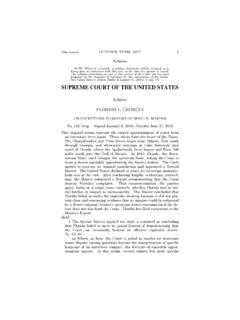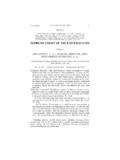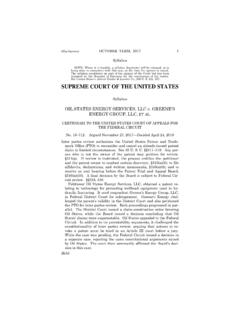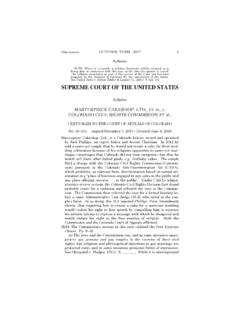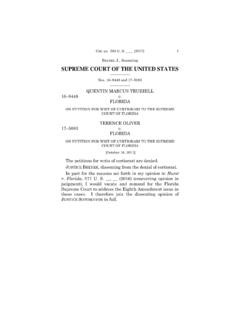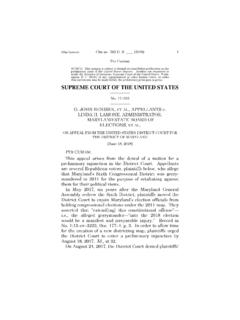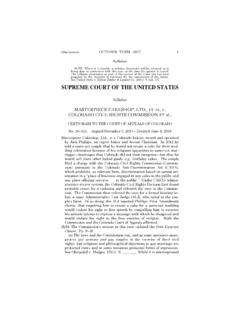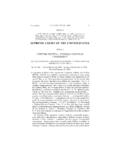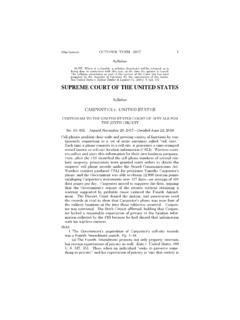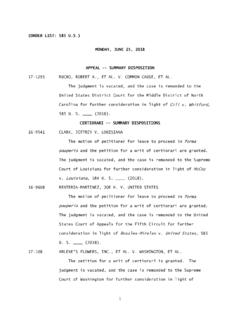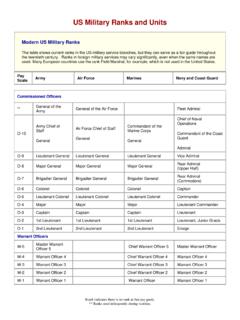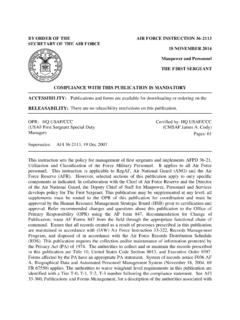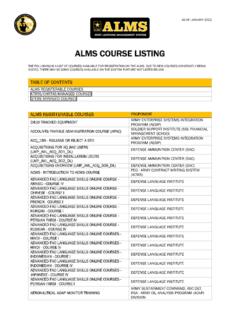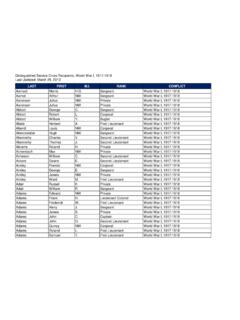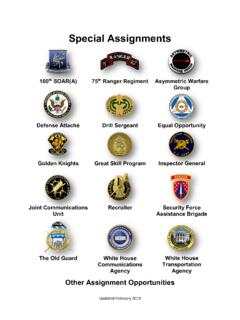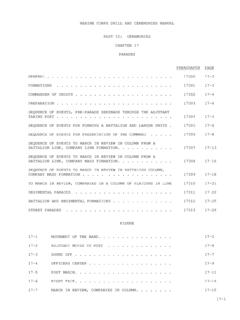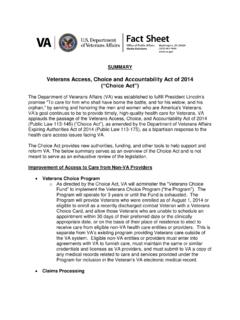Transcription of SUPREME COURT OF THE UNITED STATES
1 1 (Slip Opinion) OCTOBER TERM, 2020 Syllabus NOTE: Where it is feasible, a syllabus (headnote) will be released, as is being done in connection with this case, at the time the opinion is issued. The syllabus constitutes no part of the opinion of the COURT but has been prepared by the Reporter of Decisions for the convenience of the reader. See UNITED STATES v. Detroit Timber & Lumber Co., 200 U. S. 321, 337. SUPREME COURT OF THE UNITED STATES Syllabus VAN BUREN v.
2 UNITED STATES CERTIORARI TO THE UNITED STATES COURT OF APPEALS FOR THE ELEVENTH CIRCUIT No. 19 783. Argued November 30, 2020 Decided June 3, 2021 Former Georgia police sergeant Nathan Van Buren used his patrol-carcomputer to access a law enforcement database to retrieve informationabout a particular license plate number in exchange for money. Alt-hough Van Buren used his own, valid credentials to perform thesearch, his conduct violated a department policy against obtaining da-tabase information for non-law-enforcement purposes. Unbeknownst to Van Buren, his actions were part of a Federal Bureau of Investiga-tion sting operation.
3 Van Buren was charged with a felony violation of the Computer Fraud and Abuse Act of 1986 (CFAA), which subjectsto criminal liability anyone who intentionally accesses a computer without authorization or exceeds authorized access. 18 U. S. C. 1030(a)(2). The term exceeds authorized access is defined to mean to access a computer with authorization and to use such access to ob-tain or alter information in the computer that the accesser is not enti-tled so to obtain or alter. 1030(e)(6). A jury convicted Van Buren, and the District COURT sentenced him to 18 months in prison.
4 Van Bu-ren appealed to the Eleventh Circuit, arguing that the exceeds au-thorized access clause applies only to those who obtain information towhich their computer access does not extend, not to those who misuse access that they otherwise have. Consistent with Eleventh Circuit precedent, the panel held that Van Buren had violated the CFAA. Held: An individual exceeds authorized access when he accesses a com-puter with authorization but then obtains information located in par-ticular areas of the computer such as files, folders, or databases that are off-limits to him.
5 Pp. 5 20.(a) (1) The parties agree that Van Buren access[ed] a computer withauthorization and obtain[ed] .. information in the computer. They 2 VAN BUREN v. UNITED STATES Syllabus dispute whether Van Buren was entitled so to obtain that infor-mation. Van Buren contends that the word so serves as a term of reference and that the disputed phrase thus asks whether one has theright, in the same manner as has been stated, to obtain the relevantinformation.
6 Black s Law Dictionary 1246. He also notes that the onlymanner of obtaining information already stated in the definitional pro-vision is by a computer one is authorized to access. Thus, he continues, the phrase is not entitled so to obtain plainly refers to information one is not allowed to obtain by using a computer that he is authorized to access. The Government argues that so sweeps more broadly,reading the phrase is not entitled so to obtain to refer to information one was not allowed to obtain in the particular manner or circum-stances in which he obtained it.
7 And the manner or circumstances in which one has a right to obtain information, the Government says, aredefined by any specifically and explicitly communicated limits on one s right to access information. Van Buren s account of so best aligns with the term s plain meaning as a term of reference, as further reflected by other federal statutes that use so the same way. Pp. 5 8. (2) The Government contends that Van Buren s reading renders the word so superfluous. So makes a valuable contribution, the Gov-ernment insists, only if it incorporates all of the circumstances that might qualify a person s right to obtain information.
8 The COURT disa-grees because without so, the statute could be read to incorporate all kinds of limitations on one s entitlement to information. Pp. 8 9.(3) The dissent accepts Van Buren s definition of so, but would ar-rive at the Government s result by way of the word entitled. Accord-ing to the dissent, the term entitled demands a circumstance de-pendent analysis of whether access was proper. But the word entitled is modified by the phrase so to obtain. That phrase in turndirects the reader to consider a specific limitation on the accesser s en-titlement: his entitlement to obtain the information in the manner previously stated.
9 And as already explained, the manner previouslystated is using a computer one is authorized to access. To arrive at its interpretation, the dissent must write the word so out of the statute. Pp. 9 10.(4) The Government contends that in common parlance, the phrase exceeds authorized access would be understood to mean thatVan Buren exceed[ed] his authorized access to the law enforcement database when he obtained license-plate information for personal pur-poses. The relevant question, however, is not whether Van Buren ex-ceeded his authorized access but whether he exceeded his authorized access as the CFAA defines that phrase.
10 For reasons given elsewhere, he did not. Nor is it contrary to the meaning of the defined term to 3 Cite as: 593 U. S. ____ (2021) Syllabus equate exceed[ing] authorized access with the act of entering a partof the system to which a computer user lacks access privileges. Pp. 11 12. (b) The statute s structure further cuts against the Government s position. Subsection (a)(2) specifies two distinct ways of obtaining in-formation unlawfully first , when an individual accesses a computerwithout authorization, 1030(a)(2), and second, when an individual exceeds authorized access by accessing a computer with authoriza-tion and then obtaining information he is not entitled so to obtain, 1030(a)(2), (e)(6).
